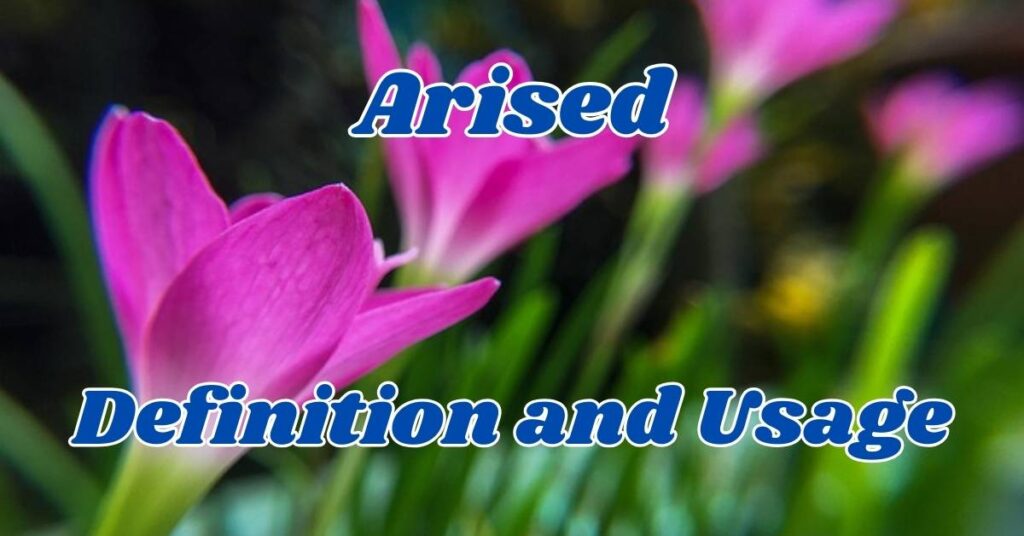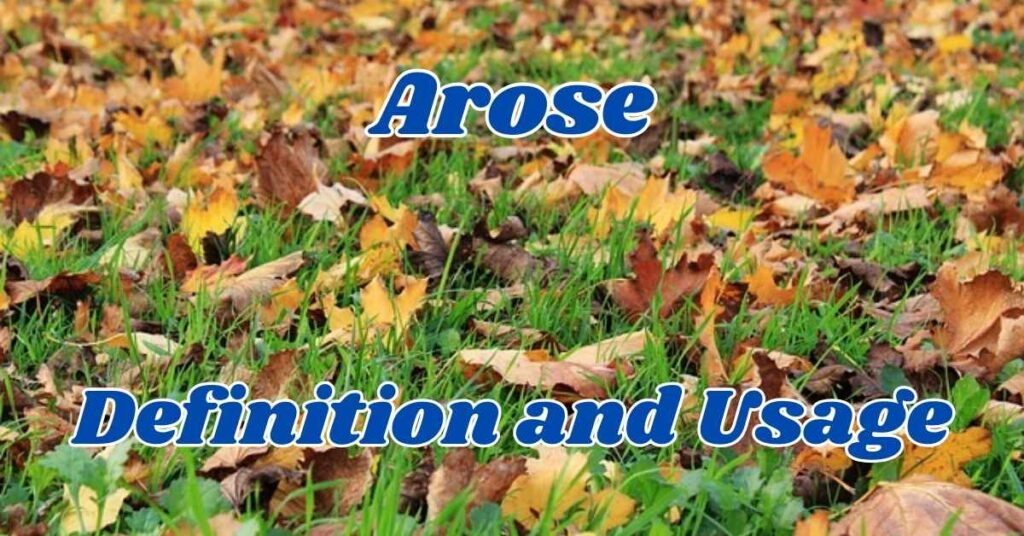The confusion between “arised” and “arose” is a common pitfall in English grammar, even for seasoned writers. While both words seem similar, only “arose” is the correct past tense of “arise.”
This article delves into the arise vs arose dilemma, clarifying why “arised” is a frequent error and providing clear guidance on using “arose” properly. We will explore the meanings of “arise” and “arose,” their linguistic roots, and offer practical examples for various contexts, from casual emails to formal reports.
Additionally, we’ll discuss irregular verbs like “arise,” related synonyms, and concepts in Natural Language Processing (NLP), such as tokenization and part-of-speech tagging, to aid in understanding AI language.
Quick Summary
“Arose,” not “arised,” is the correct past tense of “arise.” This common grammatical mistake arises because “arise” is an irregular verb. Irregular verbs don’t follow the typical pattern of adding “-ed” to form the past tense.
Just as “rise” becomes “rose,” “arise” becomes “arose.” Understanding this irregularity is key to using these words correctly and avoiding a frequent writing error. Mastering this distinction will improve the clarity and accuracy of your communication.
Understanding Arised or Arose

The confusion between “arised vs arose” often stems from the natural inclination to apply the rules of regular verbs to all verbs. Most verbs in English form their past tense by simply adding “-ed,” but “arise” is a notable exception.
This irregular conjugation can be tricky, but recognizing and remembering that “arose” is the proper past tense form is essential for clear and grammatically sound writing. This knowledge will boost your confidence in your writing and speaking.
Why It Is Not “Arised”?
The reason “arised” is incorrect lies in the nature of English verb conjugation. While many verbs follow the regular pattern of adding “-ed” to form the past tense, a significant number, including “arise,” do not.
These are irregular verbs, and their past tense forms must be memorized. There’s no simple rule or pattern to predict them. Just as we don’t say “goed” for “went” or “seed” for “saw,” we don’t say “arised” for “arose.” It’s simply a quirk of the language that needs to be learned.
Origins of the Word “Arise”
The word “arise” originates from Old English “arisan,” meaning to get up, begin, originate, or ascend. 1 It’s related to the word “rise.”
While both words were often interchangeable in the past, “arise” is now primarily used to describe the emergence of circumstances, while “rise” has become more common for other meanings. The past tense of “arise” is “arose.”
Arise: Definition and Usage

“Arise” means to emerge, originate, or come into existence. It can also mean to get up or stand. The specific meaning depends on the context in which it is used. For example, “New challenges arise every day” means that new challenges emerge.
“He arose from his chair” means he got up from his chair. In NLP, understanding the different meanings of a word is crucial for tasks like question answering.
A question answering system needs to be able to understand the question and identify the correct answer from a given text. This requires understanding the meaning of words like “arise” in different contexts.
“Arise” Meaning
“Arise” carries several related meanings, primarily revolving around emergence, origin, or standing. It can mean to come into existence, as in “New challenges arise constantly.” It can also signify originating or stemming from something, like “The conflict arose from a misunderstanding.”
Additionally, “arise” can mean to get up, as in “He arose from his chair.” Understanding these nuances is key to using “arise” and its past tense, “arose,” correctly. The context of the sentence will usually make the intended meaning clear.
Present Tense of “Arise”
Here are few present tense forms of “arise” are:
- I arise
- You arise
- He/She/It arises
- We arise
- You arise
- They arise
Pronunciation of “Arise”
The pronunciation of “arise” is straightforward: /əˈraɪz/. The “a” is pronounced like the “a” in “about,” the “ri” is like “rye,” and the “se” sounds like “size.” It’s important to emphasize the second syllable, “rise,” to distinguish it from other words.
Practicing the pronunciation aloud can help solidify it in your mind and prevent mispronunciations. Clear pronunciation is essential for effective communication, especially when discussing nuanced grammatical points like “arise” and “arose.”
Use Arise in the Past Tense
The past tense of “arise” is “arose,” not “arised.” This is a crucial distinction to remember. Use “arose” when describing something that has already happened. For example, “Several questions arose during the presentation.”
Using “arose” correctly demonstrates a strong command of English grammar. Remembering the connection to the irregular verb “rise” (rose) can be a helpful mnemonic device.
Use In an Email
In emails, especially professional ones, using “arose” correctly is essential for maintaining a polished and credible tone. For instance, you might write, “A scheduling conflict has arisen,” or “Several issues arose during the project’s development.”
These examples demonstrate the appropriate use of “arose” in written communication. Paying attention to verb tense in emails ensures clarity and professionalism, reflecting positively on your communication skills.
Use In a Formal Report
Formal reports demand precise language, and the correct use of “arose” is crucial. Sentences like, “The data suggests that a trend has arisen,” or “Several challenges arose during the implementation phase,” are appropriate for such documents.
Using the correct past tense in reports contributes to clarity and professionalism, enhancing the credibility of your work. Precise language is vital in formal settings.
Synonyms of “Arise”
- Emerge
- Originate
- Stem
- Appear
- Develop
- Occur
- Evolve
- Result
- Surface
- Commence
A Simple Table Showing the Present, Past, and Future Tense of the Verb “Arise”
| Tense | Form |
| Present | Arise |
| Past | Arose |
| Future | Will arise |
Arose: Definition and Usage

“Arose” functions exclusively as the past tense of “arise.” It signifies that something has already occurred, whether it’s an event, a situation, or a physical action. Understanding this singular purpose is crucial for correctly employing “arose” in your writing and speech.
It never appears in the present tense; its role is strictly to denote completed actions. This clear distinction from “arise” helps prevent confusion and reinforces proper grammatical usage.
Arose Meanings
Since “arose” is the past tense of “arise,” it inherits all of “arise’s” meanings but places them firmly in the past. This means “arose” can indicate the past emergence of something (e.g., “Difficulties arose during the project”), the past origin of something (e.g., “The idea arose from a conversation”), or the act of someone getting up in the past (e.g., “He arose from his slumber”). The specific meaning depends entirely on the context of the sentence.
Pronunciation of “Arose”
Pronouncing “arose” correctly is key to clear communication. The word is pronounced /əˈrəʊz/. The “a” is a schwa sound, similar to the “a” in “about.” The “ro” is pronounced like “row,” and the “se” sounds like “size.”
Emphasizing the second syllable, “rose,” is crucial for accurate pronunciation. Practicing this pronunciation aloud can help solidify it in your memory.
Past Tense of “Arose”
The past tense form of “arose” is the same for all persons:
- I arose
- You arose
- He/She/It arose
- We arose
- You arose
- They arose
Arose Usage
“Arose” is employed to describe past instances of something coming into being, originating, or someone getting up. For example, “Concerns arose among the team” indicates that worries emerged in the past.
“Arose” is essential for conveying completed actions or events in the past tense. Using it correctly adds precision and clarity to your communication, ensuring your message is grammatically sound and easily understood.
Synonyms of “Arose”
- Emerged
- Originated
- Stemmed
- Appeared
- Developed
- Occurred
- Evolved
- Resulted
- Surfaced
- Commenced
Side by Side Comparison
| Word | Correct/Incorrect | Explanation |
| Arised | Incorrect | “Arised” is not a recognized past tense form of “arise.” It’s a common mistake. |
| Arose | Correct | “Arose” is the proper past tense of “arise.” Use it to describe past occurrences. |
Everyday Usage Examples

“Arise” and “arose” often appear in formal writing, but they also fit seamlessly into everyday conversations. For instance, you might say, “Several questions arose during the meeting,” or “A new opportunity has arisen for me.”
These examples demonstrate the natural flow of “arose” and “arise” in spoken English. Understanding the proper usage allows you to communicate effectively in various settings, from casual chats to professional discussions. Remember, the key is context.
Examples of “Arised” in a Sentences
“Arised” is incorrect, so these examples demonstrate the mistake:
- “Problems arised during the project.”
- “Several issues arised unexpectedly.”
- “Concerns arised among the team members.”
- “A dispute arised between the neighbors.”
- “Difficulties arised due to the weather.”
Examples of “Arose” in a Sentences
Here are the corrected versions of the sentences above, using “arose“:
- “Problems arose during the project.”
- “Several issues arose unexpectedly.”
- “Concerns arose among the team members.”
- “A dispute arose between the neighbors.”
- “Difficulties arose due to the weather.”
Tips to Avoid the Spelling Mistake
- Remember the connection to “rise” and “rose.”
- Practice using “arose” in sentences.
- Read examples of correct usage.
- Use a grammar checker.
- Focus on irregular verb conjugation.
More Article: What’s the Plural of Scapula: Scapulas or Scapulae?
FAQS: Arised or Arose
Is it Arise or Arose?
The correct past tense of “arise” is “arose.”
Is arised the correct word?
No, “arised” is not a correct English word.
Is arose grammatically correct?
Yes, “arose” is grammatically correct.
Is arose the past tense of arise?
Yes, “arose” is the past tense of “arise.”
Conclusion
In the arised or arose debate, the answer is definitively arose. Understanding that “arise” is an irregular verb is key to remembering this crucial grammatical point. While “arised” might seem logical, it’s simply not a recognized form.
Mastering the correct past tense, “arose,” strengthens your writing and communication skills. By remembering the connection to “rise” and “rose,” and through consistent practice, you can confidently use “arose” in any context.
Don’t let this common error undermine your writing knowing the difference between arised vs arose elevates your command of the English language.
Related Post: Country’s or Countries: Which One is Correct?

